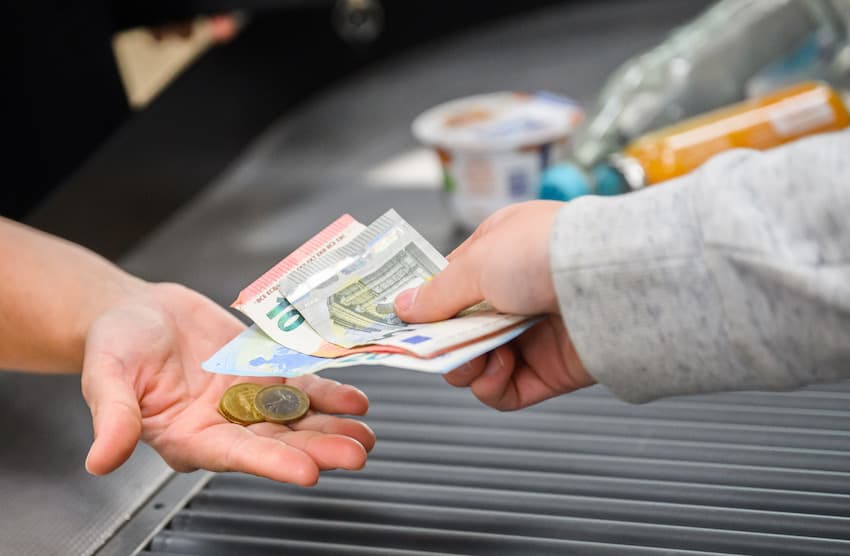Which foods in Germany will cost you more as inflation stays high?

Germany's inflation rate remained high at 6.1 percent in August as consumer prices continue to rise.
Although the annual inflation rate briefly rose to 6.4 percent in June of this year, it has now been on the decline for two consecutive months. It's worth noting however that the inflation rate had already dropped to 6.1 percent in May 2023.
From July to August this year consumer prices increased by 0.3 percent, testing the patience of consumers in Germany.
The President of the Federal Statistical Office, Ruth Brand, confirmed that "the inflation rate remains at a high level", while noting that price increases for food and energy were higher than the overall inflation rate.
Food prices were a significant inflation driver, rising by nine percent in August compared to the previous year. Consumers had to pay noticeably more for items like sugar, jam, honey, and confectionery (up 17.1%). Bread and cereal products have also become more expensive, rising by 13.6 percent, while vegetables saw a 12.4 percent price increase. At the other end of the scale, edible fats and oils were 13.9 percent cheaper than the previous year.
Energy costs increased by 8.3 percent in August compared to the previous year, with electricity being significantly more expensive, up by 16.6 percent compared to the previous year. When adjusted to exclude the volatile prices of energy and food, the inflation rate in August was 5.5 percent, consistent with July 2023.
READ ALSO: Unemployment rises in Germany as job vacancies remain at 'high level'
High inflation has been challenging for consumers has a dampening effect on private consumption, which is a key pillar of the German economy. Inflation has however come down significantly from its peak of 8.8 percent in the autumn of 2022.
Many economists expect inflation rates to continue to decline in the coming months, as the effects of the €9 transport ticket and fuel discounts from the previous year will no longer be factored into the year-on-year comparison. In the summer of 2022, these measures temporarily slowed the rise in consumer prices.
Despite these challenges, it's expected to take some time for inflation to reach a level where the European Central Bank (ECB) achieves its medium-term price stability target of two percent in the euro area. In August, the harmonised consumer price index used by the ECB for its monetary policy stood at 6.4 percent in Germany.
The ECB has been attempting to curb inflation with a series of nine consecutive interest rate hikes since July 2022. Higher interest rates can lead to more expensive loans, which can dampen demand. The key interest rate in the euro area currently stands at 4.25 percent. The ECB Governing Council will make its next decision on September 14th.
Comments
See Also
Although the annual inflation rate briefly rose to 6.4 percent in June of this year, it has now been on the decline for two consecutive months. It's worth noting however that the inflation rate had already dropped to 6.1 percent in May 2023.
From July to August this year consumer prices increased by 0.3 percent, testing the patience of consumers in Germany.
The President of the Federal Statistical Office, Ruth Brand, confirmed that "the inflation rate remains at a high level", while noting that price increases for food and energy were higher than the overall inflation rate.
Food prices were a significant inflation driver, rising by nine percent in August compared to the previous year. Consumers had to pay noticeably more for items like sugar, jam, honey, and confectionery (up 17.1%). Bread and cereal products have also become more expensive, rising by 13.6 percent, while vegetables saw a 12.4 percent price increase. At the other end of the scale, edible fats and oils were 13.9 percent cheaper than the previous year.
Energy costs increased by 8.3 percent in August compared to the previous year, with electricity being significantly more expensive, up by 16.6 percent compared to the previous year. When adjusted to exclude the volatile prices of energy and food, the inflation rate in August was 5.5 percent, consistent with July 2023.
READ ALSO: Unemployment rises in Germany as job vacancies remain at 'high level'
High inflation has been challenging for consumers has a dampening effect on private consumption, which is a key pillar of the German economy. Inflation has however come down significantly from its peak of 8.8 percent in the autumn of 2022.
Many economists expect inflation rates to continue to decline in the coming months, as the effects of the €9 transport ticket and fuel discounts from the previous year will no longer be factored into the year-on-year comparison. In the summer of 2022, these measures temporarily slowed the rise in consumer prices.
Despite these challenges, it's expected to take some time for inflation to reach a level where the European Central Bank (ECB) achieves its medium-term price stability target of two percent in the euro area. In August, the harmonised consumer price index used by the ECB for its monetary policy stood at 6.4 percent in Germany.
The ECB has been attempting to curb inflation with a series of nine consecutive interest rate hikes since July 2022. Higher interest rates can lead to more expensive loans, which can dampen demand. The key interest rate in the euro area currently stands at 4.25 percent. The ECB Governing Council will make its next decision on September 14th.
Join the conversation in our comments section below. Share your own views and experience and if you have a question or suggestion for our journalists then email us at [email protected].
Please keep comments civil, constructive and on topic – and make sure to read our terms of use before getting involved.
Please log in here to leave a comment.